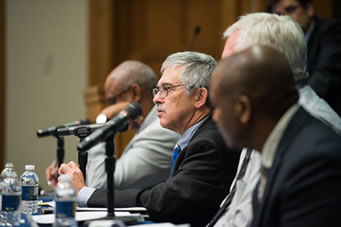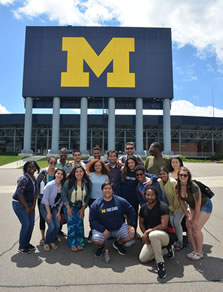The Ford School launched its five-year strategic plan for diversity, equity, and inclusion on October 5, 2016. It includes four central goals: diversifying ‘who we are’, diversifying ‘what and how we teach’, promoting an equitable and inclusive climate, and diversifying ‘our research and policy engagement’.
The planning committee, led by Shobita Parthasarathy and Susan Guindi, handed the initiative to associate dean Paula Lantz, who will serve as faculty lead for implementing the initiative over the next few years. The Ford School’s individual plan is one of 49 across campus developed as part of the University of Michigan campus-wide commitment to diversity, equity, and inclusion.
Our students, faculty, staff, and school are committed to improving diversity, equity, and inclusion in many ways. Here are just a few highlights from the past year:
- In the fall, former state Senate Democratic leader Gretchen Whitmer taught “Running, Serving, and Leading,” in which students interviewed community leaders on policy issues pertinent to Michigan such as immigration, the gender pay gap, and public education, then developed and released podcasts, now archived online.
- The fall 2015 issue of State & Hill focused on the City of Detroit and contained a number of alumni stories relevant to diversity, equity, and inclusion, including Addell Anderson (MPP '80), director of U-M's Detroit Center, on "Putting people first," Eboni Wells (MPP '13) on Detroit's response to the national My Brother's Keeper initiative, Mahima Mahadevan (MPP '11) on "What Detroit has to offer us," and more.
- Dr. Matthew Davis was appointed in October 2015 to serve on a five-person task force convened by Gov. Rick Snyder to investigate the events leading up to the Flint water crisis. The team's comprehensive report was released in March 2016. It described the crisis in Flint as a clear case of environmental injustice, and included 44 recommendations for the state government.
- In January 2016, 17 undergraduates, including five from the Ford School, were nominated for the MLK Spirit Award for exemplifying Dr. Martin Luther King, Jr.’s leadership and vision. Seven, including three from the Ford School, were selected as MLK Spirit Award recipients: Alexis Farmer (BA '16), Isa Gaillard (BA '16), and Eric Riley (BA '16).
- Reynolds Farley wrote a guest column for Bridge Magazine on Michigan’s emergency management law. He argued that the law had racist consequences and that policies should focus on making sure school districts do not need emergency managers. Farley teaches a short course at the Ford School on the history and future of Detroit.
|
|
- During the University of Michigan's Martin Luther King, Jr. Symposium, the Ford School hosted Broderick Johnson, assistant to President Obama and cabinet secretary. Johnson is chair of the My Brother's Keeper Task Force, an Obama administration initiative to address persistent opportunity gaps faced by boys and young men of color and to ensure that all young people can reach their full potential.
- In late February, the Ford School hosted a panel on “21st Century Policing: Lessons from Cincinnati” as part of the 2016 Martin Luther King, Jr. Symposium. The panel of Cincinnati community leaders discussed their 10-year process for community police reform in the wake of a deadly police shooting and community activism. The event was organized and moderated by David Thacher and Reuben Miller.
- Betsey Stevenson testified before the U.S. Equal Employment Opportunity Commission in March regarding a proposal to require employers to submit pay data that could be disaggregated by race, ethnicity, sex, and job category. Stevenson argued that this new information could help employers combat unconscious bias.
- Ford School student organization Out in Public, along with U-M student group OUTbreak, hosted a panel in March on access to health care for the transgender community. The panel discussed health care discrimination and its significant consequences on physical and mental health.
- Five Ford School master’s students attended Harvard’s 12th annual Black Policy Conference in April. Opening keynote speaker Karen Weaver, mayor of Flint, talked about strategic leadership throughout the Flint water crisis. Conference panel topics included mass incarceration, voter engagement, and college access. The students’ travel was supported in part by the Ford School’s Professional Development Fund.
- The spring 2016 issue of State & Hill focused on rising inequality, and included a number of stories relevant to diversity, equity, and inclusion initiatives such as Afton Branche's (MPP '16) story, "Amplifying policy issues that impact black lives," about Menna Demessie (PhD ’10), vice president of research and analysis for the Congressional Black Caucus Foundation, and stories about Susan Dynarski, "Tackling educational disparities in the classroom, on campus, and beyond;" Yazier Henry, "Toward a language of greater equality and peace;" Luke Shaefer, "Welfare reform redux;" Paula Lantz, "Testing an ounce of prevention with private-sector funds;" Mary Corcoran and Betsey Stevenson on "Narrowing the stubborn gender compensation gap;" and more.
|
|
|
|
- The Ford School welcomed its 2016 PPIA fellows and celebrated the 35th anniversary of the Public Policy and International Affairs program this summer. The 18 fellows spent an intensive seven weeks at the Ford School preparing for graduate school and leadership roles in public service. The PPIA program aims to promote diversity in public service and to prepare students from backgrounds traditionally underrepresented in the public sector for leadership roles.
- The Ford School and the University of Michigan hosted the tenth biennial “Graduate Horizons” program in July. Run by College Horizons, a non-profit organization, the program supports American Indian, Alaskan Native, and Native Hawaiian students preparing to apply to graduate school. Students interacted with faculty and staff mentors in their fields of interest and refined their graduate school application materials.
- In July 2016, three Ford School students were awarded the David Bohnett Foundation Leadership and Public Service Fellowship to contribute their public policy training to the City of Detroit. Abess Makki, Mary Naoum, and Mariah Van Ermen will serve in the Mayor’s Office for their summer 2017 internship. Previous Bohnett Fellows have worked on urban agriculture, sustainability, housing, public lighting, and other policy issues.
- In its pilot year, the Detroit Data Fellowship, a two-year full-time post-graduate fellowship, placed its first fellow, Reid Wilson, in the Detroit Police Department. The program takes graduates with strength in quantitative analysis, puts them through a one-week “boot camp” to bolster their skills, and assigns them to a U-M faculty member for mentorship. Fellows are then placed in a City of Detroit agency to help address social problems. The fellowship will be accepting applications for the 2017 cohort starting February 1, 2017.
- Betsey Stevenson facilitated a panel at the White House on how companies can best reduce gender and racial pay gaps on August 3, 2016. In the same month, Stevenson helped the newly-formed Employers for Pay Equity consortium design its mission and goals.
- Brian Jacob, co-director the Ford School’s Education Policy Initiative, published new research showing that students of color are disproportionately exposed to larger class sizes in Michigan. In addition, the research finds high-poverty schools are more likely to have larger core class sizes.
- Bankole Thompson’s "Redline," a public affairs radio program, broadcast live from the Ford School on October 7. Topics for the day’s program included the experience of black students on campus, U-M’s $85 million investment in diversity, equity, and inclusion initiatives, and the Ford School’s five-year strategic plan for diversity, equity and inclusion.
- U-M announced a new Poverty Solutions initiative, which will be directed by Luke Shaefer. The initiative will explore and test models to ease the effects of poverty and broadly share that knowledge, working with community groups and supporting active-learning options for students.
- Faculty from the Ford School and Survey Research Center launched a new Youth Policy Lab to improve the outcomes of Michigan youth by identifying effective public policy interventions. Led by Brian Jacob, Susan Dynarski, and Robin Tepper Jacob, the lab will provide free technical consultations to Michigan agencies and organizations, drawing on data from education, health, criminal justice, and social welfare to provide a more complete picture of Michigan youth and effective policy interventions.
- The HAIL Scholarship pilot, developed by U-M in collaboration Susan Dynarski of the Ford School, enrolled 262 HAIL Scholars from 52 Michigan counties in its first year. A two-year pilot, the program is testing a new approach to reaching and enrolling high-achieving, low-income students from across the state. The pilot initiative is part of U-M's overall diversity, equity, and inclusion strategic plan.
- Ford student groups Students of Color in Public Policy (SCPP) and Out in Public (OIP) hosted a Día de los Muertos ofrenda, or offering, and a vigil to honor victims of systemic violence and to stand in solidarity with communities battling oppression.
- The University of Michigan honored Rev. Jesse Jackson at a symposium entitled, "50 years of civil rights leadership." Rev. Jackson's keynote, "What's next for us: Hope and reflection," drew nearly one thousand people. The symposium also included two panels on "the enduring significance of Jesse Jackson for President" and "A dialogue across decades of student activists at Michigan," and featured performances by students and faculty from U-M's School of Music, Theater, and Dance.
Know of other Ford School initiatives that should be added to this list? Email [email protected].


